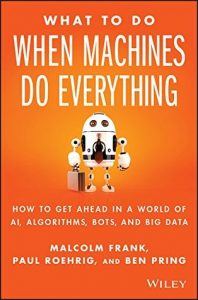Will Machines Replace Me?
Display Transcript
Digital transformation is inevitable. Like it or not, the world around us is changing and it is up to you to change the game. I read the book “What to do When Machines do everything” by Malcolm Frank, Paul Roehrig, and Ben Pricing to gain insights into how I need to be preparing for this incoming change. Historically, revolutions have occurred in various time periods. In fact, this is not the first time that people have been worried about the effects of machines on the job market. In the 1800s during the first revolution, machines made a devastating impact on the textile and agriculture industry by replacing thousands of jobs with new machines and technology.
Yet today, the job market is still booming and new sectors that did not even exist twenty years ago are thriving. The book outlined three specific reasons as to why a boom is about to occur. The first regards the term “Ubiquitech” or the idea that technology is embedded into everything. When technology is everywhere, transformation can come from anywhere. The second is that by 2030 standards, we stink. In the year 2030, we will look back and wonder how we tolerated many aspects of today’s society. Finally, becoming digital means mastering the three M ’s- raw materials, new machines, and business models. With the digital revolution, enterprises are organizing their people and processes around the capabilities of the machines. They are challenging traditional company structure and lomoki8ng towards predicting future success rather than relying on what was successful in the past.
With the rise of technology, there will be blood shed. It is predicted that roughly 12 percent of existing jobs are at risk of being replaced by automated intelligence, however 75 percent of existing jobs will be altered or enhanced by the bot. This reinforces the idea that digital transformation will affect everyone and it is our duty to be informed. In the digital era, your raw material is no longer oil, it is data. Data must be mined, refined, and distributed.
Today’s leaders need to be able to take this commodity that is readily available and turn it into a competitive advantage. Companies that are serious about digital transformation will always go where the data points. Those who are making true progress towards “being digital” have increasing faith in data and they recognize it as their source for proprietary insights and advantage. Machines and automated intelligence are already here, but it is up to the leadership of the company to effectively implement them.
The most critical roles that machines can play are in highly repetitive tasks, tasks requiring low levels of empathy, and tasks involving high volumes of data. The steps that each company should take in order to automate a process include setting an automation strategy, starting small, developing a prototype, piloting and scaling, and finally evaluating the results. There are two traditional mindsets regarding digital transformation. There is the dystopian mindset that robots will take over and eventually overpower humans and there is the utopian mindset that technology can only improve the world and will make everyone happier. Neither of these two mindsets are fully correct, which brings us to a third pragmatic outlook.
Pragmatics believe that the future can be good if we make smart, practical decisions. The world is changing faster than ever. AI isn’t coming, it is already here. I will leave you with the final sentence of the book- Those who win in the coming great digital build out, who seize the incredible rewards, who make history will be those who stop debating and start building- and rather than predicting the future, go out and invent it hand-in-hand with the new machines. Thank you.

Image of the cover of the book What To Do When Machines Do Everything
“What To Do When Machines Do Everything” By Malcolm Frank, Paul Roehrig, and Ben Pring discusses the benefits and potential consequences of the digital era. Digital transformation isn’t just coming, it’s already here, and this book outlines the steps that you can do to be prepared for this technological revolution. When technology is everywhere, transformation can come from anywhere. Rather than predicting the future, Frank, Roehrig, and Pring encourage readers to go out and invent it, hand-in-hand with the new machines.
College students are the demographic that will be most affected by digital transformation, and this book gave me key insights into how I can prepare myself for the digital era. The workforce we are entering now will look completely different than the workforce we will be a part of in twenty or thirty years. It is essential that students have an appetite for reinvention and have the desire to be ahead of all the change occurring around them. This book gave me the tools necessary to be ahead of the incoming changes and successfully navigate the digital era.

Gillian Murphy
Member of Cohort 7 of the Lockheed Martin Leadership Institute
View Biography
Gillian Murphy is a Mechanical Engineering major at Miami University, graduating in May of 2020. She is also pursuing a minor in Paper Science and will be interning with Graphic Packaging throughout the spring and summer of 2019. She Is currently the Vice President of Miami University’s student chapter of Engineers Without Borders, a humanitarian engineering organization with the mission to engineer a better world. The chapter is currently working on projects in Rwanda and Uganda as well as partaking in local initiatives here in Oxford. She is also a member of Theta Tau, a professional engineering fraternity where she has served as both the academic chair and the liaison. In her free time, Gillian is currently training to run the flying pig half-marathon in Cincinnati this May!
Within the Lockheed Martin Leadership Institute, Gillian is heavily involved in the year-long project on digital transformation. She is a member of the production team and has taken the lead in editing. Throughout the semester, Gillian has learned valuable communication skills while working with her team. Digital transformation is important to her because she wants to be as prepared as possible to enter the workforce after graduation next year. Digital transformation will be affecting every company, and she wants to have the skills necessary to navigate any situation she will encounter.
